The Oligarchs (57 page)
Authors: David Hoffman

THE CERTIFICATE FOR THE ALL-RUSSIAN AUTOMOBILE ALLIANCE
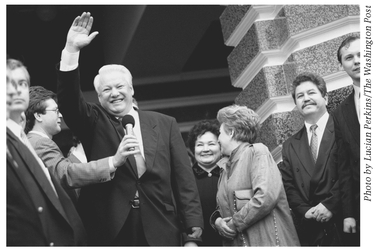
YELTSIN ON THE CAMPAIGN TRAIL IN 1996.
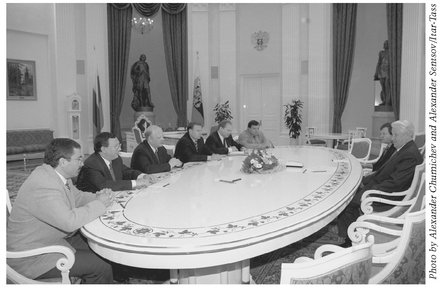
PRESIDENT YELTSIN MEETS WITH THE FEUDING OLIGARCHS ON SEPTEMBER 15, 1997, DURING THE BANKERS' WAR. VALENTIN YUMASHEV IS TO YELTSIN'S RIGHT. THE OLIGARCHS ARE, FROM LEFT TO RIGHT: MIKHAIL KHODORKOVSKY, VLADIMIR GUSINSKY, ALEXANDER SMOLEN- SKY, VLADIMIR POTANIN, VLADIMIR VINOGRADOV, AND MIKHAIL FRIEDMAN.
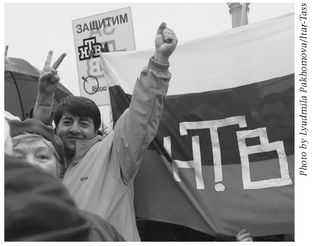
DEMONSTRATORS GATHERED OUTSIDE NTV IN APRIL, 2001 TO PROTEST THE TAKE-OVER OF GUSINSKY'S INDEPENDENT TELEVISION CHANNEL.
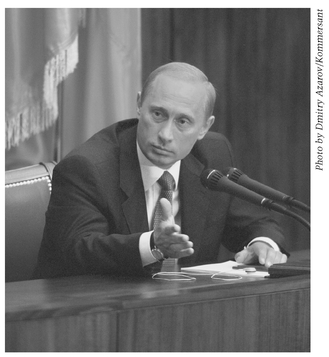
PRESIDENT VLADIMIR PUTIN
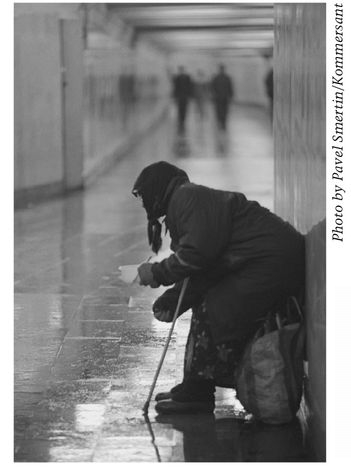
A WOMAN BEGS FOR MONEY IN A MOSCOW UNDERPASS A DECADE AFTER THE SOVIET COLLAPSE. FOR MANY, THE CHANGE FROM COMMUNISM TO CAPITALISM MEANT IMPOVERISHMENT.
A COUPLE IN RED SQUARE AT A RALLY FOR YELTSIN AT THE END OF THE 1996 CAMPAIGN. THE YOUNGER GENERATIONS FOUND IT EASIER TO ADAPT TO THE CHANGES OF THE 1990s.
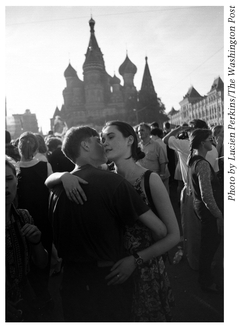
Chapter 13
Saving Boris Yeltsin
I
N DAVOS, a tiny Swiss Alpine ski resort, Gennady Zyuganov, the Russian Communist leader, stopped in the lobby of the Sun Star Park Hotel to give another autograph. Mikhail Berger, the economics editor of
Izvestia
, watched with a sense of alarm as a swarm of Western business executives hovered around Zyuganov, hanging on his every word and pumping his hand, their eyes expectantly surveying the possible next president of Russia. Zyuganov, fresh from his triumph in the December parliamentary elections, purred pleasantly to his Western suitors. He gave about twenty interviews a day to the press. He rubbed shoulders with the world's financial and political elite at the annual conference of the World Economic Forum in the first week of February 1996. Amid the tinkling of champagne glasses, the unceasing corridor chatter, and the crush of a standing room only press conference, Zyuganov stole the show in Davos, presenting himself as a kinder, gentler Communist who would respect democracy and some kinds of private property. Leading the early polls in the campaign for the Russian presidency, Zyuganov called himself “the most peaceful man on the planet” and insisted he would not undertake wholesale renationalization. “We understand that if we start taking
factories back, there's going to be shooting from Murmansk to Vladivostok,” he declared. Berger, who had been close to the reformers since the early days, reported from Davos that Zyuganovâa beefy, muscular man with a high forehead and thinning, pale hairâwas the center of attention among Western moneymen. “The impression was that the West was already prepared to recognize him as the next president,” Berger reported.
1
N DAVOS, a tiny Swiss Alpine ski resort, Gennady Zyuganov, the Russian Communist leader, stopped in the lobby of the Sun Star Park Hotel to give another autograph. Mikhail Berger, the economics editor of
Izvestia
, watched with a sense of alarm as a swarm of Western business executives hovered around Zyuganov, hanging on his every word and pumping his hand, their eyes expectantly surveying the possible next president of Russia. Zyuganov, fresh from his triumph in the December parliamentary elections, purred pleasantly to his Western suitors. He gave about twenty interviews a day to the press. He rubbed shoulders with the world's financial and political elite at the annual conference of the World Economic Forum in the first week of February 1996. Amid the tinkling of champagne glasses, the unceasing corridor chatter, and the crush of a standing room only press conference, Zyuganov stole the show in Davos, presenting himself as a kinder, gentler Communist who would respect democracy and some kinds of private property. Leading the early polls in the campaign for the Russian presidency, Zyuganov called himself “the most peaceful man on the planet” and insisted he would not undertake wholesale renationalization. “We understand that if we start taking
factories back, there's going to be shooting from Murmansk to Vladivostok,” he declared. Berger, who had been close to the reformers since the early days, reported from Davos that Zyuganovâa beefy, muscular man with a high forehead and thinning, pale hairâwas the center of attention among Western moneymen. “The impression was that the West was already prepared to recognize him as the next president,” Berger reported.
1
The Zyuganov appearance in Davos led to a quiet drama that was to change Russia's course once again. Anatoly Chubais, Boris Berezovsky, Vladimir Gusinsky, Mikhail Khodorkovsky, and Yuri Luzhkov all attended the conference and watched Zyuganov's appearance with varying degrees of alarm and anxiety. They knew him better than the corporate mavens who crowded around him in the hotel lobby. Led by Berezovsky, they decided on the spot to try and save Boris Yeltsin.
Ousted by Yeltsin and unsure of his own future, Chubais cut a lonely figure at Davos in 1996. It was the fifth time he had been invited to the World Economic Forum, and he personally knew many of the captains of Western industry. They had once regarded him as the greatest hope for Russian reform. But now Chubais was out of office, and Zyuganov was on the rise. The adulation for Zyuganov stunned Chubais. He told me that in Davos, “I saw many of my good friends, presidents of major American companies, European companies, who were simply dancing around Zyuganov, trying to catch his eye, peering at him. These were the world's most powerful businessmen, with world-famous names, who with their entire appearance demonstrated that they were seeking support of the future president of Russia, because it was clear to everyone that Zyuganov was going to be the future president of Russia, and now they needed to build a relationship with him. So, this shook me up!”
2
2
Chubais called back to Moscow and spoke to Arkady Yevstafiev, then deputy director of ORT television, who had been his press spokesman and adviser in the early days of privatization. Chubais asked for copies of the Russian Communist Party platform and other Zyuganov statements, which Yevstafiev quickly faxed to Davos.
3
On the closing day in Davos, Chubais called a press conference in which he denounced Zyuganov for “a classic Communist lie,” presenting himself as a moderate to the Westerners while saying something quite different at home. “There are two Zyuganovs, one for foreign and one for domestic consumption,” Chubais said, reading from a Communist
Party text that called for nationalization of energy and banking and reversal of privatization. If the Communists return to power, Chubais insisted, “the first move will be to forbid the free press.” Then Zyuganov will “put in prison all his political enemies.” He warned darkly, “My judgment is that this kind of policy will inevitably lead to big bloodshed in Russia.”
4
3
On the closing day in Davos, Chubais called a press conference in which he denounced Zyuganov for “a classic Communist lie,” presenting himself as a moderate to the Westerners while saying something quite different at home. “There are two Zyuganovs, one for foreign and one for domestic consumption,” Chubais said, reading from a Communist
Party text that called for nationalization of energy and banking and reversal of privatization. If the Communists return to power, Chubais insisted, “the first move will be to forbid the free press.” Then Zyuganov will “put in prison all his political enemies.” He warned darkly, “My judgment is that this kind of policy will inevitably lead to big bloodshed in Russia.”
4
Gusinsky was also alarmed by Zyuganov's appearance in Davos. Gusinsky recalled that earlier, in Moscow, he held long discussions with Zyuganov, urging him to become a social democrat, as other former Communists had done in Eastern Europe, saying that if Zyuganov would cast himself simply as a champion of the downtrodden, he would enjoy a long political career. “Stop being a Communist, put the label away, don't scream about private property,” Gusinsky urged Zyuganov. “This is normal, so turn normal!”
5
5
But in Davos, Gusinsky realized Zyuganov would not change. “I was present at the meeting between Zyuganov and Swiss bankers. It was very important for me to see how he was going to behave. And when I saw that he was looking into their eyes and lying to them, that he was saying exactly what they wanted to hear, a typical Soviet Communist KGB trick, I knew it! They will close us down. The minute he wins, he'll shut us down. I was frightened.”
Zyuganov's silky words to the Western businessmen also gave Berezovsky a start. “Zyuganov was a danger to us, and to Russia,” he told me later that year.
6
The compressed ball of energy went into action. For nearly a year, Berezovsky had been at odds with Gusinsky, but in Davos he picked up the phone in his hotel room and called him. They quickly agreed to meet. Both set aside their differences, which went back to the 1994 fight over Aeroflot and the faces in the snow episode. “We didn't waste time finding a common language,” Berezovsky recalled. “We both understood that the threat of a return to Communism required a joint counter-attack.”
7
Gusinsky recalled later that Berezovsky came to him and said, “I think it is time for a truce. The country is at a crossroads, to the left or to the right. These are not the elections, but almost a civil warâwithout shots being fired.”
6
The compressed ball of energy went into action. For nearly a year, Berezovsky had been at odds with Gusinsky, but in Davos he picked up the phone in his hotel room and called him. They quickly agreed to meet. Both set aside their differences, which went back to the 1994 fight over Aeroflot and the faces in the snow episode. “We didn't waste time finding a common language,” Berezovsky recalled. “We both understood that the threat of a return to Communism required a joint counter-attack.”
7
Gusinsky recalled later that Berezovsky came to him and said, “I think it is time for a truce. The country is at a crossroads, to the left or to the right. These are not the elections, but almost a civil warâwithout shots being fired.”
“I completely agreed with him,” Gusinsky told me. “I believe that if it had not been for Berezovsky at that time, Yeltsin would not be the president of Russia, and most likely history would have been different.”
Berezovsky also got a warning in Davos from the financier George Soros, who feared Zyuganov would defeat Yeltsin. Soros recalled
telling Berezovsky that if the Communist leader were elected, the tycoon would “hang from a lamppost.”
8
Berezovsky's recollection of the conversation was that Soros told him Zyuganov was a sure winner and Berezovsky should leave the country to save himself.
telling Berezovsky that if the Communist leader were elected, the tycoon would “hang from a lamppost.”
8
Berezovsky's recollection of the conversation was that Soros told him Zyuganov was a sure winner and Berezovsky should leave the country to save himself.
Berezovsky would have none of it. “George, I think that we will manage to defeat Zyuganov,” Berezovsky confidently told Soros. Then “I had the impression that he looked at me as if I were mad.”
“Boris,” Soros replied, “you are wrong.”
9
9
Berezovsky next talked to Chubais, alone. Berezovsky suggested that Chubais bring together a group of tycoons to back Yeltsin. Then he and Gusinsky attended the Chubais press conference with Berger, the journalist, sitting between them, and they loved every word of Chubais's attack on Zyuganov.
10
Berezovsky then went to Mikhail Khodorkovsky, Vladimir Vinogradov, who was also in Davos, and even to Luzhkov, seeking support for an alliance to save Yeltsin. Their alliance became known as the Davos Pact. Although Luzhkov did not formally join the businessmen, he decided to throw his weight behind Yeltsin, setting aside the strains of 1994â1995.
10
Berezovsky then went to Mikhail Khodorkovsky, Vladimir Vinogradov, who was also in Davos, and even to Luzhkov, seeking support for an alliance to save Yeltsin. Their alliance became known as the Davos Pact. Although Luzhkov did not formally join the businessmen, he decided to throw his weight behind Yeltsin, setting aside the strains of 1994â1995.
Other books
The Rock Jockeys by Gary Paulsen
Coyote Gorgeous by Vijaya Schartz
The Game of Shepherd and Dawse by William Shepherd
Empires of the Word: A Language History of the World by Nicholas Ostler
Rock Star Ex by Jewel Quinlan
Eye Candy by R.L. Stine
The Lion's Love Child by Jade White
Edge of Destruction by Franklin W. Dixon
To the Edge of the World by Michele Torrey
Pagan's Daughter by Catherine Jinks